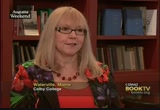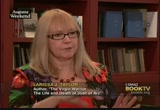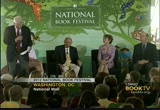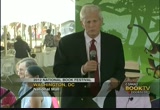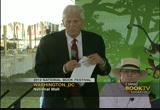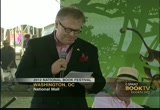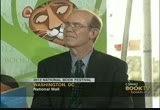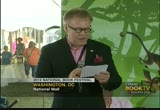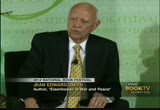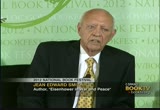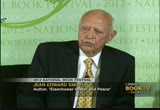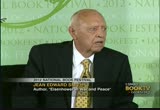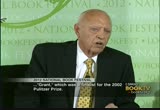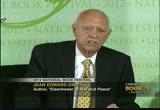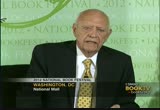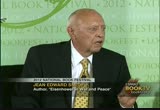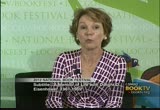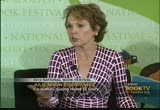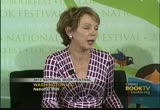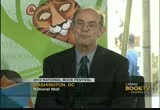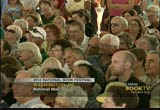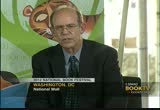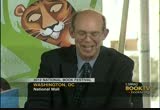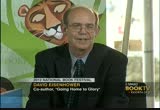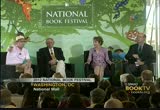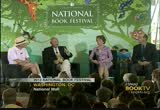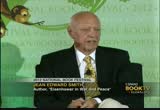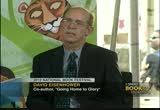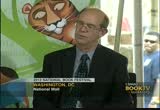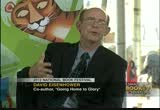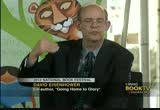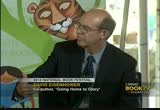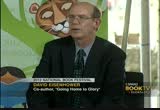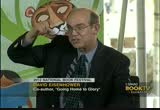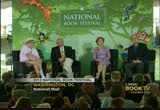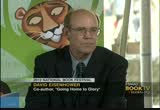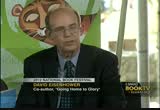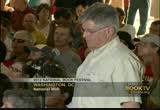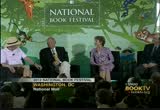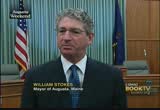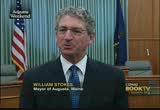tv Book TV CSPAN October 7, 2012 7:00am-7:45am EDT
7:00 am
she did not mind them and drag them to church all the time although she suggested to go to church before fighting. it's a very different picture. and even her sainthood, which i think it's made her into a don't mess with joan kind of figure, which i found out a lot. people were not necessarily happy with my interpretation because i wanted to situate her firm as a girl growing up in the 15th century, and having this extraordinary thing happened to her because of her. and in the process to really change the course of 100 years war, and change the idea of france. but i think the larger theme is our view of women in history. because i think students come income and a lot of historians and non-historians repeat the idea that history is always progressive. it started out with women with no rights and suddenly we all have all right. we know that's not true but one of the things it tells me is
7:01 am
that history is a zigzag, that at times in history there was definitely a place for very strong women, in this case a teenage girl, to operate and have a really strong effect on historical events. so i think it's a good corrective to what we tend to assume about, especially the middle ages. >> watch booktv all weekend to see more of the visit to augusta, maine. for more information on this and other cities, go to c-span.org/localcontent. >> from the 12th annual national book festival in washington, d.c., a discussion about dwight eisenhower with biographer jean edward smith, author of "eisenhower in war and peace," and david eisenhower and julie nixon eisenhower, authors of "going home to glory." it's about 40 minutes.
7:02 am
>> we hope you have been enjoying this extraordinary national book festival.nj [applause]vedore >> we have involved more authore than anytime in the 12 yearstor history of this festival. we'rey thankful. your responses make the free public event possible, and one of them is the wells fargo, which has been the sponsor of this particular pavilion, history and biography. in a moment, i introduce to you michael l. golden, wells fargo's regional president for greater washington, d.c., who will introduce our closing authors today. we're privileged to have with him, of course, not only an extraordinary biographer but also the two inheritors of the
7:03 am
legacy of the man who is not only led what is often called the greatest generation to victory in the world war ii, but also led the country to eight years of peace and prosperity, which are now becoming recognized in good part thanks to these authors we have with us today, to close things out. being recognized by historians for the contribution he has made to our national life. so, ladies and gentlemen, i'm happy to hand over for the last act in your main tent, wells fargo sponsored for us, mr. golden, who will introduce everybody and it's a tremendous closing act, if you like, to a wonderful day, blessed with sunshine, with all your presence, and i think we've got
7:04 am
an extraordinary cast for this which he will be pleased ands to introduce, and i'm sure we're all going to profit from this wonderful last act to a memorable day. thank you, and all the best to the people in the discussion. mr. golden. [applause] mr. golden. [applause] >> thank you, dr. billingsley. wells fargo is delighted be one of the desponsors of the book festival and the history pavilion. next we have a very special program devoted the life and legacy of dwight david eisenhower. i'm especially pleased to introduce this segment because i was born at the end of the eisenhower presidency. some of my grandfather's favorite memories -- my favorite memories were spent with my grandfather who was a huge president eisenhower fan.
7:05 am
such a fan that when he visited my mother and i in the hospital for the first time, he told my mother, his daughter, i have the perfect name. let's name him dwight david gelden. my mother preferred michael, obviously, but throughout my childhood, my grandfather reminded me many times, you were really supposed to be named dwight david golden. how delighted would my grandfather be if he knew who i was about to introduce today. we're fortunate to have david eisenhower and julie nixon eisenhower joining us, david is an author, public policy fellow and grandson of dwight david eisenhower, a scholar at the an anyoneburg school of communication in pennsylvania. in 1987 he was a finalist for a pulitzer prize for his book, eisenhower at war, 1942 to 1945. david's new book, co-authored with his wife julie eisenhower, is going home to glory iry, a
7:06 am
memoir of the life of dwight d. eisenhower, 1961 to 1969. like her husband, julie eisenhower is also an author. she is in addition the daughter of the 37th president, richmond m. m. knickson from 1,973rd to 1975 she was assist stand managing editor for the saturday evening post, and weles welcome jean edward smith, white house book is, eisenhower in war and peace. he has written much praised biographies for franklin del know roosevelt roosevelt and ulysses s. grant. mr. smith is a senior scholar at --s' spent time at the at toro. and our moderate you're will be jonathan yardley.
7:07 am
he has been a feeman fellow at washington university. his most recent book, a compilation of the most memorable reviews of noted and neglected book from the past. please join me in welcoming david and julie eisenhower, jean edward smith, and jonathan yardley. [applause] ... president eisenhower's career,
7:08 am
started as a general and then ae president. we are getting with really one s of the most underrated figuresan in american history, both as a general and as president.one ofa one ofso the reasons for that is because of eisenhower made everything he did look easy. you may recall those bumper stickers in the election of 1956. ben hogan for president. if we are going to have a golfer, let's have a good one. [laughter] eisenhower was franklin roosevelt's first choice to command the d-day invasion. eisenhower had three amphibious landings under his belt at that time. he got along well with the british and was churchill. that was very important and professor roosevelt there was no question he was going to pick eisenhower although he gave general marshal the opportunity to accept -- text to command the invasion if he wanted and eisenhower was
7:09 am
characteristic, self disciplined, refused to express an opinion and president roosevelt selected ike. no one else could develop the western armies together as he could and his decision to land on d-day in spite of the weather caught the germans totally by surprise. they had no idea that innovation was coming. can you imagine 5000 ships in the english channel and the germans not knowing it because of the weather? that happened. the decision to want to take pairs with ike's decision, to take paris was his decision as well. they were to bypass pairs and continue to the german army. he said he would not destroy it if the allies could get their and they really only had two days to do that. otherwise he would relieve them. ike changed his plan to paris. ike took the command really to
7:10 am
the battle of the bulge after upon which they broke through in december of 1944. eisenhower took personal command, gave the command to patton and the command of all the troops north of the montgomery including the american seventh core and let them run out of speed, run out of gas and when they did the german army was no longer capable of any type of offense of action. it was an incredible decision that eisenhower made any made it on the spot. eisenhower also was grossly underrated as president. eisenhower made peace in korea immediately assuming office in before sending off as he went to korea on a piper cub. he looked at the back line and decided -- over the objections of the party, the generals on the spot in korea. eisenhower made peace. after eisenhower made peace in korea not one american served
7:11 am
died in combat for the next eight years. [applause] eisenhower believed limited war with the contradiction in terms. you don't go to war unless you mean to go to war and you do it all out and as a result you remain at peace for the next eight years. eisenhower also was even-handed in its approach to his foreign-policy. when britain and france and israel invaded, took the suez canal our two oldest allies, our youngest allies general eisenhower insisted that they withdraw and he not only insisted that he organized or the secretary of secretary of the treasury a round, a run on the british pound which left the british with no alternative but to withdraw. domestically eisenhower's progressive conservative.
7:12 am
he believed largely in a balanced budget and he was against deficit spending but he also believed the government had a positive role to play. the interstate highway system, which eisenhower -- which was eisenhower's brainchild. [applause] more money was spent on the intraday -- interstate highway system than the new deal from 1839 to 18 to 41 with zero impact on the budget because it was paid for through gasoline taxes. [applause] thethe st. lawrence seaway connecting the great lakes, opening the great lakes to traffic again had been on the drawing board since the administration of theodore roosevelt and eisenhower -- eisenhower took, assumed the presidency in a time of mccarthyism and incredible communist witchhunt.
7:13 am
he did it as he did so many things in the background. it was eisenhower orchestrated the army's response in the army mccarthy hearings. i'm not going to get into a contest but that stunk. and when it was over mccarthy had him vanquished but i think it was the desegregation issue perhaps in which eisenhower most often underestimated. president truman had ordered the army to be desegregated in 1950 but the that the army had not complied. 85% of the army was still segregated when i had to power. ike ordered the military services to desegregate and of course this was a new supreme commander whose words they immediately obeyed. he culminated the segregationists of will service
7:14 am
and after brown versus board of education, and he ordered the integration of the central high school in little rock and the demonstrations there which blocked the desegregation eisenhower ordered the 101st airborne division from fort campbell to little rock to enforce desegregation with a forceful message to everyone in the south that the desegregation integration was the loss of land and eisenhower was going to support it with the armed forces of the united states. what a powerful message. [applause] but finally, eisenhower did not take the lead in rgb advantages of integration as john f. kennedy and lyndon johnson to. eisenhower felt this was a difficult till -- pill to swallow and the best way to get them to do that was to stress that this was the law.
7:15 am
this was the rule of law and he is president was going to take care of the law. it made it much easier, and easier pill for the south to swallow. [applause] >> jonathan is great to be with you today and with all the booklovers at this fabulous festival and with a very distinguished biographer, jean edward smith way think has contributed immeasurably to the eisenhower scholarship and i have to agree he was underestimated definitely and i'm so glad that you have written such a powerful book. i think it's fascinating in reading the book to see that more of the book is focused on the military career, even though as you've just spent almost most of your time talking about the incredible eight years of of the eisenhardt registration, the
7:16 am
estate leaned over and whispered to me i have never heard the interstate highway system applauded before. pretty exciting. first-time. >> all those people who were applauding are now going to get on 395 and be stuck in traffic or three hours. [laughter] powerbook is a different kind of book. it's a memoir. it's david's memoir about life with his grandfather and it starts the day that his grandfather left office and really, the book you get to get it three ways. it's an intimate story of the grandson and a beloved grandfather. it's a story of the 60's and that whole turbulent time after the war in vietnam and the protests. and it is also a study in power because on january 20, 1961, dwight eisenhower was the most powerful man in the world. and as we do in our democracy,
7:17 am
peacefully he surrendered power to his successor, john f. kennedy. he got it in 1957 chrysler imperial with mamie and they went on to gettysburg and to do the horn and say goodbye to the secret service. one of the things that we do that really david helped him write it so i don't want to say we so much but the assistant, one of the things david does with my help us to talk about how eisenhower filled a very important role in the 60's counseling his successors. kennedy, johnson and nixon and when you think about the war and i think jane smith made a very good point that eisenhower didn't believe in incremental steps in a war. he tried to counsel johnson. certainly when my father came into office because he died only three months after my dad, presidency my father missed having that but again it's great to be with all the booklovers and i'm also among your ranks
7:18 am
and now i turn it over to the author of the book. i am the helper and the assistant but is the one -- it's really his story, so david. [applause] >> it it's an honor indeed to be here at this book festival which is extraordinary if and to be in the presence with mr. smith who has done something i really admire and that is right and antithesis and that is synthesizing a military career and a political career all in one or her medical subject each. my efforts in this field were enumerated at the beginning of the program and i am proceeding at as much slower pace. actually the book that julie is referring to, "going home to glory" is about eisenhower's
7:19 am
third career. he was an army general and then he was a president and he than he became a farmer. in gettysburg and my family, my father, my mother, my three sisters and i, the eight of us lived in gettysburg and this was about growing up with dwight eisenhower and experiencing him as a neighbor, grandfather on the scene, a boss, a former president of the united states. julie made a very important point and that is the significance of this transition, where this book picks up. dwight eisenhower is the first president to serve under the operation of the 20 2nd amendment. under the 20 2nd amendment, america, and this is different, america requires men like dwight eisenhower, men with extraordinary vitality -- we required them to give up our. these were people who would rule forever in lots of societies. we not only require them to surrender power but we required them to be good sports about it.
7:20 am
[laughter] and so on january 20, 1961 as he is turning over the reins of power to his successor and he knows his legacy is now in the loving hands of the democrats, he is required to be a good sport about this and to make this work. i think that this is a very important dimension of an ongoing story that is chronicled by jean edward smith, "eisenhower in war and peace." what america is doing is, america's rewriting the ruleboof mr. smith's book deals with the military-industrial complex that eisenhower issued as the leading officer. that is a speech which above all addresses what i think is the great paradox of the 20th century and that is how we can combine such growth in such progress, i highway system being part of this, with the horrors
7:21 am
of the 20th century, the first world war and the great depression and world war ii and the cold war and the threat of nuclear annihilation. reads great horrors and great progress coexisted throughout the 20th century and the idea was come in eisenhower's mind, but that this was a paradox and american democracy which was growing so quickly on such an overwhelming scale, had to understand or are reorients itself in these new circumstances, and so he ran. he was a republican particularly when i knew him in the 1960's, very much a republican and in fact i was raised in sort of a nonpolitical family. i was a perfect -- for one of the greatest practical jokes in va history and that was my nomination and election and acclamation in absentia the only
7:22 am
political office i've ever held in that as secretary of treasury of the young democrats. [applause] this became a news story which was how my parents found out about it and they thought it was kind of funny. my granddad did not think it was funny at all. the man i've known his granddad i became to know is general and he was a partisan and 1960's was also a trustee. he was somebody came to power at the end of this enormous victory which had costs and raise complex issues for our society, like every surviving society of world war ii. and stepped forward as someone determined to restore a two-party system, restored constitutional balance between the presidency and the congress and then by his example, depart office into establishing a 20th century, 21st century custom. as a reminder that we are a nation under laws and that no one in america is indispensable
7:23 am
and that's what it's distinguishing about our country is leadership at all levels and in all places. and i think that is what his life and legacy really is. it is an honor to be here in washington at this wonderful event and we are looking forward to responding to anything the members of the audience would have to say. again i admire mr. smith's ability to synthesize on this subject and he dealt with the areas we have covered in great depth. and these are various approaches to a very wonderful subject and one that i am glad to see is receiving such attention today. thank you very much. [applause] >> i would like to urge those of you who would like to address
7:24 am
questions to the panelist would come up and line up behind the two microphones that are in these isles. we will be ready for you to start in just about a minute. i just wanted to make the observation that we are talking this afternoon about a president whose reputation has fluctuated fairly substantially over the half-century since he left the white house and mr. smith in particular would be able to address this because the first book of his that i read in many ways the book that i still admire most passionately as his biography of ulysses grant who of course waited for more than a century to see his reputation pulled out of the ashes in the great misunderstanding of the service in the white house so anything you all might like to say about where ike's reputation is now and raise it going, think it would be interesting. >> i think there's no question that eisenhower's reputation is of only -- is on the upswing
7:25 am
just as general grants was on the upswing. eisenhower had three careers. he was also president of columbia university. he is president of columbia for five years and then he did a marvelous job at columbia. the budget was in terrible shape. he balanced the budget in the organize columbia's first funds drive. he defended academic freedom at columbia at a time when i was not popular and he defended columbia faculty. he provided really a -- for which every university present could hide. in november of 1948 come dewey lost the election and when tom dewey lost the election in 1948, eisenhower had bigger fish to fry. because the republican nomination in 1952 is going to be open at that point and he had lost interest a little bit at
7:26 am
columbia and went to nato to defend that nato's forces and so forth but he did an outstanding job at columbia and he would have gone on to do an outstanding job except he had a higher calling. >> david as i recall rather early in your book you say that you saw ike's reputation editing someone. do you still feel that way? >> well live look, in fact the connection with grants to me is very interesting. i think we look back nostalgically on world war ii in this great unqualified success and so i think the one thing we have not recognized both i believe in voters and the electorate in the 1950's did recognize is that we were really undergoing a post-war reconstruction period and the 1940s and 1950's so the parallel between eisenhower and grant, lincoln and roosevelt is a very compelling one and i
7:27 am
think another reason that people have not focused on this parallel is because of ulysses s. grant's reputation and i remember that subject by all people -- was a friend of ours and came to visit us when julie's dad was in the white house in 1969, and we were standing in a room where ulysses grant signed treaties and i made some crack about his reputation and as a marine, chuck said this is a career that has to be completely re-examined and for the reasons that i think you have laid out. america underwent the post-war reconstruction and i think it lasted until the moment that julia and i were involved in 72 and 73 first-hand. this was the end of the vietnam war and this was a long post to
7:28 am
your war in which america rebuilt asian rebuild europe and rebuilt the better world and eisenhower is a global version of grant as fdr is a global version of it abraham lincoln. >> thank you. we have about 10 minutes for questions and use you sir are first. >> president eisenhower first ran 60 years ago. where do you think he would be if he were running today and on the issues of today? [laughter] [applause] >> this is directed to mr. smith. [laughter] >> i am will say one thing. i believe that jean edward smith would agree about this, is the motive for the connection between the contemporary republican party and the republican party of the late 1940s and early fifties is the
7:29 am
value it places on the private sector and for enterprise. and this is the episode of the eisenhower of administration that i remember best and i have to say i think is the most important and certainly part of his second administration and that was the desegregation of central high school in little rock in 1957. i can remember we were living in northern virginia and we were driving past the school every day. we were in school in the northern virginia area and what the gop has done since the late fifties, it has established itself in the south but it did so in julie's dad's as well as reagan and other important republican politicians. when the south became a two-party region, it became that on the basis of economics and private enterprise.
7:30 am
texas became a republican state because it was having tremendous economic development and virginia and north carolina and other states. the idea was the republicans were not going to go south and help the democrats on segregation but they would try to transcend the issue by emphasizing economic development. this is the connection between the republican party for as long as i can remember. julie and i were actually gets in the white house about six years ago and we had an occasion after dark to walk along the south lawn and around the driveway where we had walked so often before and julie excused herself to walk up the walkway to peer into the oval office. she saw the busts and president george w. bush's office of dwight eisenhower and he kept the busts there throughout his eight year presidency as a texan
7:31 am
and as somebody who recognized as his father did and the southerners did and as republicans did that the eisenhower presidency and 52 begins a dialogue that we have had ever since in which the position will wax and wane and there will be stronger arguments and weaker arguments at any given time that we have a robust are and we also have an effective public sector. and the republicans basically are advocates for the private sector and that is the connection. >> what is something we would know about president eisenhower as a farmer after he retired from public service or his public life? >> what would he know about him? something that we talk about in "going home to glory." i learned an early lesson i think in leadership that i
7:32 am
articulated before he went i went to college and that is he was a leader and i saw the way people responded to him and understood that to be the case. i knew he was special but above all he was a leader on the farm because he took everything we did so seriously and he was so well informed on everything we did. i think the lesson i take away is that you do not ask others to do that which you are unwilling to do yourself and he was someone who understood his operation. he was also the first person to hire me so i was grateful. he was the first to hire me so i was sort of surprised by that. i worked for six years on the farm and i relate to this end "going home to glory." we played a game of honeymoon bridge over lunch hour that when a little long and we thought the general was downtown. as it turned out he was on the grounds, broke up our game and i experience the eisenhower temper. that was seeing the mouth move
7:33 am
and i wasn't sure exactly what it was saying except i did pick out, you are fired. [laughter] he was a very dynamic fellow. two hours later we had a golf date and i was unsure whether he was going to show up. he did and he came to our home and the 4:00 we went out to the gettysburg country club and we played the first hole and silence in the second hole in silence silence and at the end of the third hole and i'm sure mr. smith encountered this come he said david i allow my sissy is one mistake a year and you have that yours. and by the fourth hole i had been rehired. [laughter] to air his human introvert give his divine. what he knew about them and gettysburg is this was a leader. someone who take things seriously forgive the new went to be tough and he knew when to be forgiving. >> i have a question for david eisenhower. in 1960, and this goes to julie's, she might understand some of it.
7:34 am
1968 richard nixon looking for the republican nomination of the president and i'm just and eisenhower was basically trying to be neutral in the entire thing but at some point he felt compelled and i have always tried to figure out, was the influence or what was the process? i know he was facing a coalition of reagan and rockefeller and i guess even george romney is in there somewhere but i'm just curious what you have to say about that. >> the sequence goes like this. julie and i were engaged in november of 1967. richard nixon announced to the white house january 31, 1968 and dwight eisenhower endorsed him in late july of 1968. now i'm describing the happiest day of my life. when finally he stepped down from his position of neutrality to endorse richard nixon. i think the idea there is that in 1968 was a year in which
7:35 am
republicans could win and i think that therefore quite eisenhower extended an endorsement very carefully and made it very clear to me when julie and i were together that he would be doing, observing his own practice and so forth in the election. he finally became persuaded that his vice president, richard nixon, had the qualifications to address the conundrum of 1968. there was a dominant issue in 1968. the vietnam war and we were losing in richard nixon campaigned on almost a brittle pledge to end the war and dwight eisenhower came to understand what that meant and finally decided to cause via the qualifications to be president in 1968 that he would prevail.
7:36 am
finally he endorsed him in july. julie had something to do with it because my grandfather was very entranced by julie. and i prompt you i had nothing to do with it. i knew that if i raised it or even asked, this was taking liberties so i had nothing to do with it. >> we have time for only one more question for those of you who are in line, you can ask questions shortly, but here in the studio audience one more question. >> thank you. you mentioned being a good sport about turning over power and i think it's very interesting that both your grandfather and father were clearly partisan but had to be a good sport. that capacity seems to be largely missing. you have respect lives on where we are and what has gone wrong and maybe even how we can fix that?
7:37 am
>> eisenhower had a republican congress for the first two years. joe martin was speaker of the house and he had a very difficult time dealing with republicans on capitol hill. the democrats took over in the election of 1954. >> sam rayburn became speaker can and lyndon johnson was majority leader. eisenhower got along marvelously with rayburn johnson. eisenhower have did to be born in the district which it heard. they thought alike and they put the national interest first. they were aware of the party interest as well and almost all of the legislation in the eisenhower period period stems from a time when it was a democratic congress. it was a different time in that respect and that differ slightly from the answer to the first
7:38 am
question as to where eisenhower would be today. back in 1952, running for the republican nomination, seems to me and eisenhower defeated the republican party of today. >> on that note -- the. [laughter] [applause] >> see would be defeated in the republican party of today. [applause] >> it would like to thank our distinguished panelists and it's been an honor to have the three of them here. i urge you to read their books which are as every bit as good as you think they >> this event was part of the 2012 national book festival in washington, d.c. for more information visit loc.gov/book fest.
7:39 am
>> coverage of her recent visit to augusta, maine, continues on booktv. >> it's the only city in mena has a major river. we occupy both sides of the river. we have an east and west side of the river and the river has become a defining point for us. that's unique about augusta. the other thing that is unique is where the state capitals with access to, we host the state legislature and the governor's mansion, and, of course, have all the government services that you would expect to have. state capital has its benefits. we're very proud of being the state capital. as most capitals, whenever you have a state government in your backyard it can pose some difficulties, some sort of stresses, but we have a good working relationship with the state and get along with them,
7:40 am
and we appreciate very much the benefits of being the capital provides spirit can you speak to some of us challenges? >> for example, with significant amount of untaxed property because the state is here, all of the state property does not pay property taxes. so that puts a burden on the property taxpayer in augusta, the residential owner, the commercial owner, when you have such a large part of, or large number of government buildings and properties in the city which don't pay taxes. it put, but use our services, user fire and our police and so forth, use our roads. so it puts a stress or extra burden on property taxpayers. that's part of the burden that the city has to bear for being the capital city. and, of course, sometimes when the state wants to do something it doesn't necessarily follow the typical ordinances that most
7:41 am
businesses and residents have to apply, comply with state, you know, city ordinances don't miss it should apply to the state. so that can be a friction point on location but we try to work through those things. and understand that with the benefits of being the capital city far outweigh some of the downsides that we deal with. the biggest challenge is always jobs, and i think that's true of any community. you've been around the last week. you see what we have to offer for augusta. it's a vibrant community with a lot going on. with a brand hospital coming online. we will have a brand-new courthouse, commerce center down the road, major construction. we're going to have some big construction projects on the interstate that are going to make traffic movement. with commercial development going on in the city. and last year during the census of 2010 we gained of almost 550
7:42 am
people. which doesn't sound like a lot but with about eight or 9%, the first time augusta grew since the 1970 consensus. there's a lot of positives. we have a downtown area that is revitalizing and is growing businesses and people. young people want to live there and businesses want to locate downtown. there's a lot going for us. >> augusta, maine, was first established in 1629 and/or settled as a town in 1754. the city is not the capital of maine. booktv visited the city with the help of our partner time warner cable to explore the local lyric, and historical atmosphere. >> read a friday, i think you people because of stephen king that people who enjoy reading his books and show people that like reading about the small town try to but i think we also like nonfiction stories about
7:43 am
their state. people similar and i think they want to read stories about states that are landlocked. i'm not sure the typical reader, if i would see anything, their people to want a good story, you know? and not a pretentious story. you often see people in maine that have, may be wealthy but they will wear flannel shirts but they don't show off their wealth. i think people, if i could say anything about stories, they want people that are true, not flashy or showy. i can see them relating to the story about a simple, you know, simple people who go about their lives. i think the writers in maine, they take from what they know. i think writers will write about memoirs, families, historical things that happen in maine whether it's more about the sea and our connection to -- maine has a great fishing tradition as
7:44 am
well so i think mainer are like canadians, they love their ski stories. those real stories about our past. joshua chamberlain, you know, who was courageous during the civil war. i think they are very proud of their history and they want to learn about leaders who have inspired people of maine, like our leaders senator susan collins it's i think people enjoy knowing more about their history, their past. >> watch booktv all weekend to see more of a recent visit to a custom-made. for more information on this and other cities visited but booktv's local content vehicles go to c-span.org/localcontent. >> here's a look at some books that are being published this week.
196 Views
IN COLLECTIONS
CSPAN2 Television Archive
Television Archive  Television Archive News Search Service
Television Archive News Search Service 
Uploaded by TV Archive on

 Live Music Archive
Live Music Archive Librivox Free Audio
Librivox Free Audio Metropolitan Museum
Metropolitan Museum Cleveland Museum of Art
Cleveland Museum of Art Internet Arcade
Internet Arcade Console Living Room
Console Living Room Books to Borrow
Books to Borrow Open Library
Open Library TV News
TV News Understanding 9/11
Understanding 9/11